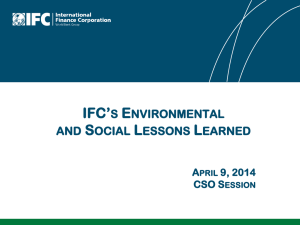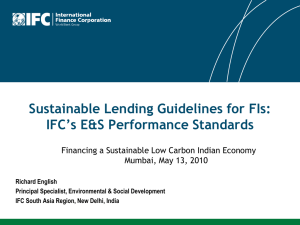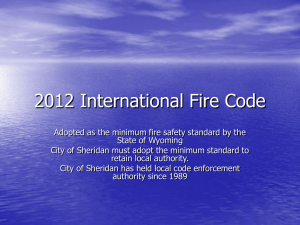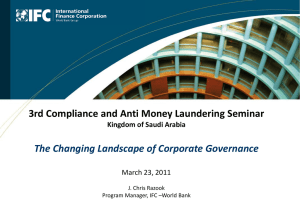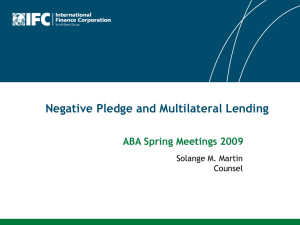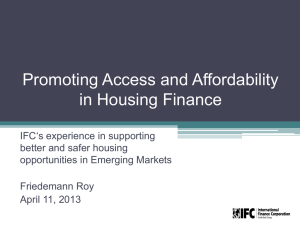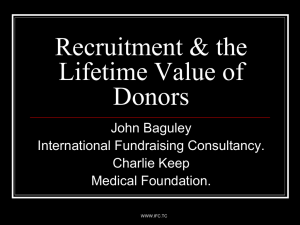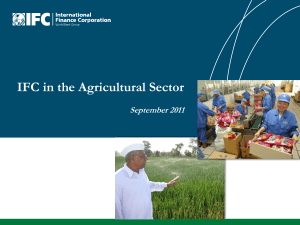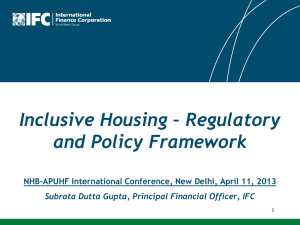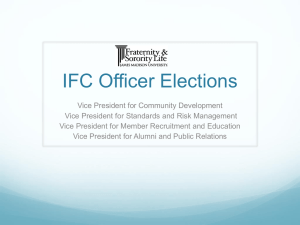Terms of Reference
advertisement
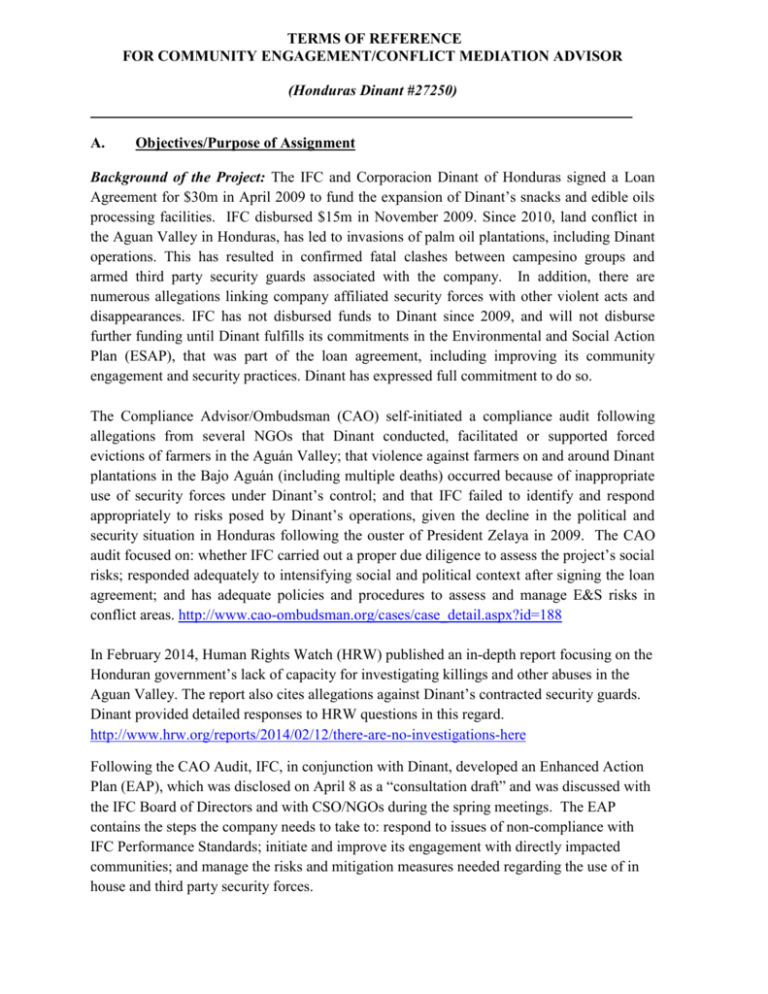
TERMS OF REFERENCE FOR COMMUNITY ENGAGEMENT/CONFLICT MEDIATION ADVISOR (Honduras Dinant #27250) A. Objectives/Purpose of Assignment Background of the Project: The IFC and Corporacion Dinant of Honduras signed a Loan Agreement for $30m in April 2009 to fund the expansion of Dinant’s snacks and edible oils processing facilities. IFC disbursed $15m in November 2009. Since 2010, land conflict in the Aguan Valley in Honduras, has led to invasions of palm oil plantations, including Dinant operations. This has resulted in confirmed fatal clashes between campesino groups and armed third party security guards associated with the company. In addition, there are numerous allegations linking company affiliated security forces with other violent acts and disappearances. IFC has not disbursed funds to Dinant since 2009, and will not disburse further funding until Dinant fulfills its commitments in the Environmental and Social Action Plan (ESAP), that was part of the loan agreement, including improving its community engagement and security practices. Dinant has expressed full commitment to do so. The Compliance Advisor/Ombudsman (CAO) self-initiated a compliance audit following allegations from several NGOs that Dinant conducted, facilitated or supported forced evictions of farmers in the Aguán Valley; that violence against farmers on and around Dinant plantations in the Bajo Aguán (including multiple deaths) occurred because of inappropriate use of security forces under Dinant’s control; and that IFC failed to identify and respond appropriately to risks posed by Dinant’s operations, given the decline in the political and security situation in Honduras following the ouster of President Zelaya in 2009. The CAO audit focused on: whether IFC carried out a proper due diligence to assess the project’s social risks; responded adequately to intensifying social and political context after signing the loan agreement; and has adequate policies and procedures to assess and manage E&S risks in conflict areas. http://www.cao-ombudsman.org/cases/case_detail.aspx?id=188 In February 2014, Human Rights Watch (HRW) published an in-depth report focusing on the Honduran government’s lack of capacity for investigating killings and other abuses in the Aguan Valley. The report also cites allegations against Dinant’s contracted security guards. Dinant provided detailed responses to HRW questions in this regard. http://www.hrw.org/reports/2014/02/12/there-are-no-investigations-here Following the CAO Audit, IFC, in conjunction with Dinant, developed an Enhanced Action Plan (EAP), which was disclosed on April 8 as a “consultation draft” and was discussed with the IFC Board of Directors and with CSO/NGOs during the spring meetings. The EAP contains the steps the company needs to take to: respond to issues of non-compliance with IFC Performance Standards; initiate and improve its engagement with directly impacted communities; and manage the risks and mitigation measures needed regarding the use of in house and third party security forces. http://www.ifc.org/wps/wcm/connect/REGION__EXT_Content/Regions/Latin%20America %20and%20the%20Caribbean/Strategy/Corporacion_Dinant It is now critical to develop and execute a transparent and robust process complementing the Enhanced Action Plan to address security-related issues and ensure credibility for associated outcomes. The current environment of distrust between some community members and the company, as well as dissatisfaction with progress to date in government prosecution of violent crimes makes this a daunting and complex task - expectation management will be critical. Dinant, has made progress on previous action plan items concerned with several aspects of community engagement such as: 1) a socio-economic baseline of over 40 communities in four regions where the company has operations including the Aguan Valley; 2) focus group meetings in many of these communities; 3) a draft of the company’s grievance mechanism was piloted in some communities in the Comayagua area, and; 4) various items concerned with security forces protocol, training and capacity building of in house and third party security and work on memorandums of understanding with Government of Honduran Military and Police. Objective of the Assignment: IFC’s Environment, Social and Governance Department (CESG) now seeks to engage a consulting firm (“Firm”) to advise the project team and initiate dialogue though a conflict mediation process, and facilitate the community engagement process related to the consultation on the draft Enhanced Action Plan (EAP) that has resulted from the CAO Audit findings on Dinant. The IFC and Dinant have committed to CSOs and the Executive Directors (EDs) of the Board that they will consult on the draft EAP, in particular in the Aguan Valley of Honduras, an area where land rights and conflict seem most severe and where Dinant has oil palm plantations and processing facilities. In particular, the assignment includes: 1) Carrying out initial consultations with key stakeholders on whether and how dispute resolution skills can help stakeholder address and resolve their critical issues, and what scope would be mutually credible; 2) Contingent on the above, completing a comprehensive conflict mapping exercise of the Aguan Valley to aid in the understanding of the complex nature of the situation, where there are multiple stakeholders and communities with conflicting views; 3) Advising and supporting all stakeholders (including the IFC project team, Dinant and their consultants, SNV to design, manage and facilitate the community engagement process in the Aguan Valley) regarding the draft Enhanced Action Plan; and 4) Advising, designing and potentially mediating a broader stakeholder dialogue on Aguan Valley issues contingent on shared stakeholder interest, support and feasibility of scope. Page 2 of 7 B. Scope of Work The work will be broken down into several stages. These stages are outlined below and will be further developed after the initial Stage 1 is completed and parties agree to move forward. At that time a more in depth work plan giving more details will be developed for each stage prior to moving forward. Stage 1: Testing of Concept/Pre-Assessment; Stage 2: Participatory Stakeholder Assessment and Consultation Process; Stage 3: Stakeholder Alignment on Dinant Enhanced Action Plan and stakeholder roles/responsibilities; Stage 4: Broader Multi-Stakeholder Dialogue on Aguan Valley Issues (contingent upon support and participation from a broader range of stakeholders including Government and other donors / international organizations, World Bank, OAS, IDB, NGOs/CSOs, etc.). Stage 1: Testing of Concept and Pre-Assessment Rationale for a Participatory Stakeholder Assessment and Consultation Process As part of Performance Standard requirements for consultation in the context of the Dinant project, IFC would like to explore the possibility of a participatory stakeholder assessment of issues, conflicts and opportunities for dialogue and conflict resolution. The goal of that assessment would be for Dinant stakeholders (including affected communities and their representatives, IFC and Dinant management, and potentially other stakeholders) to determine jointly: a) whether and how they might work together to address some or all of the concerns that have led to conflict over the Dinant project; b) the process for consultation on Dinant’s Enhanced Action Plan; and c) whether and how a formal grievance mechanism or other mechanisms for institutionalizing dispute resolution and dialogue could be useful. IFC seeks inclusive, transparent and informed assessment of environmental and social issues and risks as the basis for dialogue and consultation. By jointly designing the assessment, participating actively in it, and jointly reviewing the results, IFC and other Dinant stakeholders may be able to develop mutually agreed and credible information about the situation on the ground and the root causes of conflict, and a deeper understanding of each other’s viewpoints and ideas on how to handle ongoing challenges and opportunities. Developing an agreed plan for the assessment and subsequent consultation process that is supported by all the stakeholders is key in a participatory approach. Page 3 of 7 What is a Participatory Stakeholder Assessment? A participatory stakeholder assessment is a process through which stakeholders in conflict, assisted by an impartial assessor, jointly develop a shared understanding of the issues in conflict, the interests and root causes underlying their conflicts, and the options that may be available to resolve those conflicts. Participatory stakeholder assessment requires active involvement and constructive contribution of key stakeholders in planning and participating in the assessment, in order to create mutally credible findings and the potential for well-informed and wise problemsolving moving forward. More explicitly, in a participatory assessment process, stakeholders jointly: Define key issues to be explored via the assessment; Undertake conflict mapping; Identify stakeholders to be interviewed; Develop interview protocols and other forms of stakeholder communication; Review the findings of the assessment and determine how best to move forward in light of what they have found. In the case of Dinant, low trust levels among parties and lack of meaningful documentation with respect to past stakeholder enagagement necessitate this approach. A Participatory Stakeholder Assessment requires that the scope of the assessment and consultation process (i.e. which issues are included and which are not) is discussed and negotiated among key stakeholders before iniating the effort. The stakeholders make a good faith commitment to help to complete the assessment and discuss its results. In this case, IFC, Dinant, and affected communities would need to commit to using the results to inform their decision making about how best to engage and resolve disputes, where necessary, with regard to the Dinant palm oil project. Step 1: Pre-consultation to test the feasibility of a participatory stakeholder assessment and consultation process The consultants will circulate this concept note to IFC, Dinant management, and community representatives, in order to test support for it. If there is interest in principle, the consultant will work with the stakeholders to refine the approach until there is agreement on how to proceed. The consultant will not undertake an assessment unless it is agreed among IFC, the company, the affected communities and other key stakeholders. The components of intial consultation would be to: Clarify the shared understanding and commitment to such an approach on the part of IFC, and Dinant leadership/management; Page 4 of 7 Consult with concerned CSOs in Washington and Honduras, and community representatives in Dinant’s areas of palm oil operations, regarding their willingness to be involved and contribute to the process (e.g. scoping, data collection, analysis of findings). Several issues to be clarified in the consultants pre-consultation step are: IFC’s understanding of its role and responsibilities as primary sponsor of this endeavor; Dinant’s commitment to participating in the process and to using the results to influence its engagement with affected communities; Affected communities’ willingness to participate and to use the results to inform their engagement with Dinant’s management and with IFC. Should the consultants’s intial, short-term consultation efforts indicate that there is shared interest in moving forward with a participatory asssesesment, the consultants would bring key stakeholders together for in-person scoping (in Washington, Honduras, or both). That discussion would address the questions of scope, methodology, stakeholder participation, funding and oversight of the assessment. Step 2: Scoping Visit, Planning and Assessment Design Assuming initial support from stakeholders per step 1, the consultants would carry out scoping visits (both Washington and Honduras potentially) to complete the pre-assessment planning and design phase involving multiple stakeholders, which would set the stage for the inclusive participatory stakeholder assessment and consultation process. This step would aim to further build credibility, ownership and agreement among stakeholders, IFC and the company before starting. It would involve a potentially wider set of consultation interviews to clarify appropriate scope and logistics for in-depth assessment interviewing, focus groups, and review of existing project information and documentation of stakeholder perceptions. Step 2 would likely involve an additional 2-3 weeks of engagement and design within Stage 1. Step 3: Prepare a Concept Note and Detailed Work Plan Formulate a Concept Note based on the key issues that have arisen from scoping to outline the tasks to take place in Stage 2 and present that Concept Note at a Workshop among key stakeholders. Agreement among stakeholders will be needed to gain information and acceptance from the various parties to move forward with the next phase. Step 4: Finalize Concept Note and Stage 2 Work Plan Finalize the Concept Note and Work Plan for Phase 2 based on feedback from stakeholders at above Workshop, and present to IFC to initiate Stage 2 of the process. Timeline Page 5 of 7 The assignment will commence in late June with various components being undertaken in parallel as agreed between IFC and the consultant. A detailed work plan, timeline, and budget will be developed at the start of each Phase. Due to the nature of the situation, IFC anticipates the likelihood of downstream work. IFC reserves the right to continue engaging the selected Firm on IFCs approval, based on, among others, the Firm’s performance and other relevant factual circumstances. Stage 2: Full Participatory Stakeholder Assessment, Conflict Mapping and Consultation Process Pending results of Stage 1, the consultant will develop a detailed work plan, including the various tasks, resources and time line for the second stage of consultation (i.e. Participatory Assessment) on the Enhanced AEP as attached in Annex 1, and which has been drafted for consultation by IFC based on some preliminary conversations with Executive Directors, CSOs and Dinant. Stage 2 implies that stakeholders help guide data collection, joint analysis of findings, and ultimately the development of recommendations to be utilized by IFC and the company to implement the Enhanced Action Plan. The details of this approach would be a direct outcome of Stage 1. This step would include completion of a (more thorough) conflict mapping/stakeholder analysis of the Aguan (and potentially the Lean Valley as well – to be scoped out in country) Valley that could help guide the development of a region wide/Aguan Valley community engagement approach and specific grievance mechanism. This effort would build upon existing work that SNV has been completing the past year regarding stakeholder mapping, social baseline survey, focus groups and capacity building to create a conflict map. The consultant and SNV, with stakeholder support, would potentially work closely together given SNVs existing knowledge and on the ground presence. Stage 3: Alignment Building on a Dinant Enhanced Action Plan and Stakeholder Roles/Responsibilities moving Forward. Stage 3 implies a negotiated dialogue/consultation process, based on the results of the Participatory Assessment aimed at further defining Dinant’s Enhanced Action Plan and how to implement it. Specific community engagement actions and activities will be defined with stakeholder input, along with protocols and timelines. A key aspect of this stage is the elaboration of a an operable and reliable greivance/community feedback mechanism. Stage 4: Broader Multi-Stakeholder Dialogue on Aguan Valley Issues It is also likely that additional issues and conncerns arise from impacted communities during prior stages of engagement that may indicate the need for multi-stakeholder dialogue on the broader issues of the Aguan Valley. Such an effort, given its complexity, would be again be contingent upon support and participation from a broader range of stakeholders including Government and other donors / international organizations, World Bank, OAS, IDB, Page 6 of 7 NGOs/CSOs, etc. This would consititute a longer-term effort toward addressing systemic regional challenges and opportunities. C. Deliverables / Specific Outputs Expected from Consultant The Consultants will work with Project staff to develop the following key deliverables for Phase 1: Pre-Consultation MOU (June-July) among the stakeholders stating their viewpoints/interest in proceeding with a participatory assessment and consultation process, and/or clarification as to why it is not feasible, with any alternatives that consultants may recommend; Inception Report (after Scoping meetings, July); Conflict Mapping Report (end of July, early August); Preparation of a Concept Note for Phase 2 Consultation Activities and presentation to Stakeholders at Workshop to verify process (August); Completion of Concept Note and Work Plan for Phase 2 (late August / early September). Electronic copies will be preferred. The deliverables will be in a form and substance acceptable to IFC and stakeholders. IFC will have 10 working days to comment on the draft Concept Note and Work Plan and a Final Report will be delivered 5 days after the IFC’s comments are received by the Consultant. D. Specific Inputs to be provided by the Client: IFC will make available all project documents of relevance to this project, both public and confidential in project files. The IFC will make all personnel that have worked on this project available for consultation. The company and their consultants will also make itself available as needed when the consultants are in country and via telephone when they are remote. E. Special Terms & Conditions / Specific Criteria The assignment and all information related to the assignment are confidential; under no circumstances should they be disclosed to third parties not specifically assigned to work on the assignment, pursuant to the provisions of the Contract, without IFCs explicit consent. Page 7 of 7
